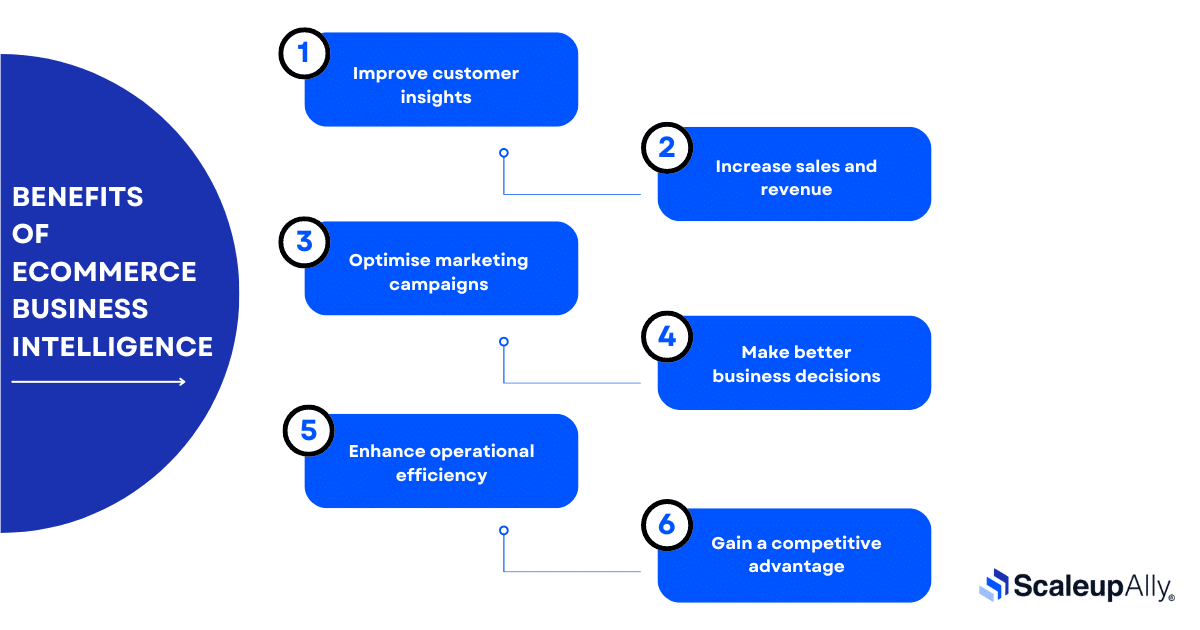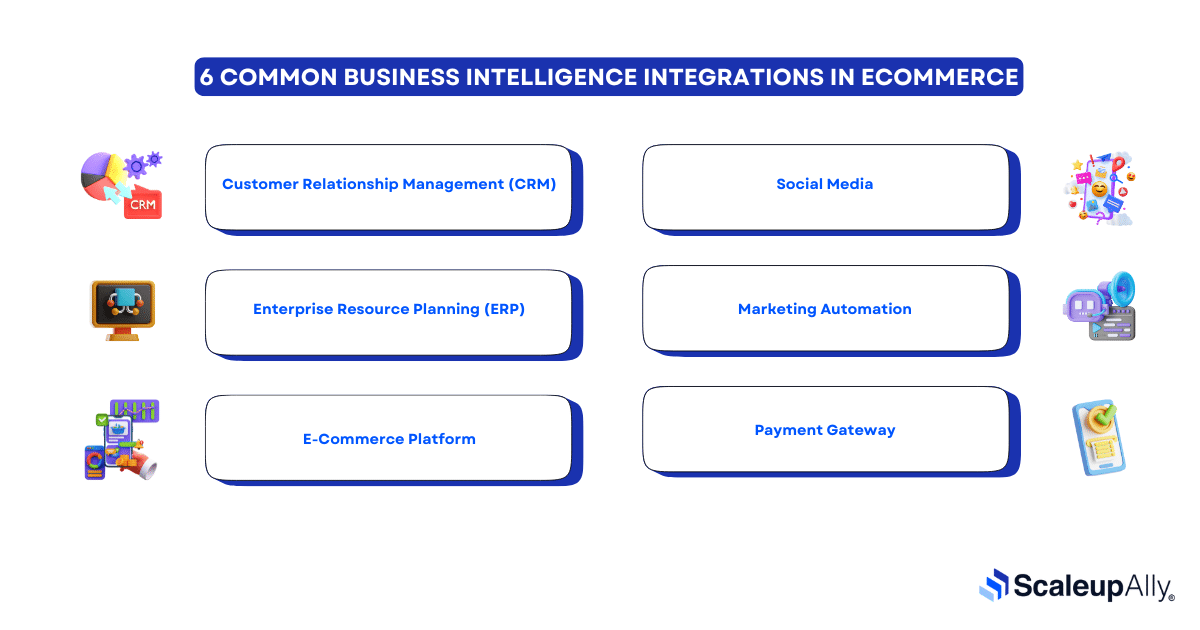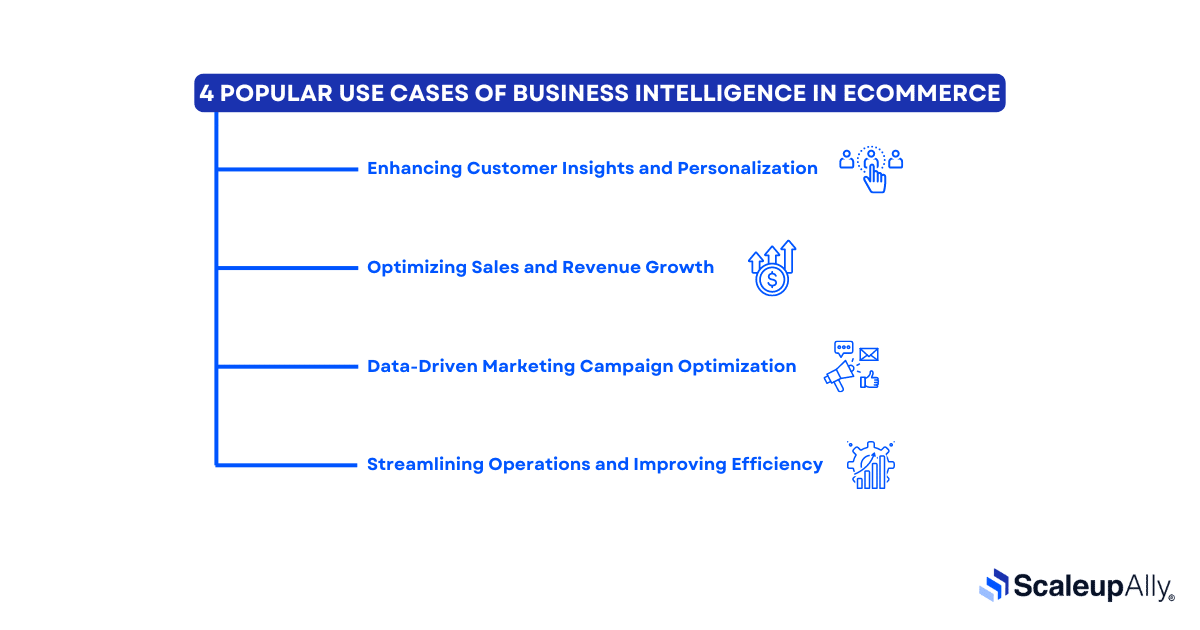
Ecommerce Business Intelligence: Why Do You Need It?
Tarsem Singh | September 29, 2024 , 21 min read
Table Of Content
In a world where every click counts, where a pixel’s placement can be the difference between triumph and tumble, the realm of e-commerce stands as a thriving battleground. A battleground where giants like Amazon, Alibaba, and Walmart wage fierce wars of algorithms, convenience, and user experience.
But here’s the jaw-dropping revelation: they are not alone in this race.
In the colossal landscape of e-commerce, the data says that by 2026, the e-commerce market is expected to total over $8.1 trillion. Amazon, one of the e-commerce behemoths, captures roughly 49% of the U.S. e-commerce market. That’s nearly half of all online sales in the country.
This digital arena is not merely about selling products; it’s about orchestrating a symphony of data-driven intelligence. Imagine if you could unlock the secrets to boosting your conversion rate or the sorcery of doubling your average order value.
So, let’s embark on a journey into the world of e-commerce business intelligence, where data is your secret weapon for success.
Key Takeaways
- E-commerce Business Intelligence (BI) involves collecting, analyzing and visualizing data from sources like sales, website analytics and customer interactions to enhance decision-making and operational efficiency.
- E-commerce BI improves customer insights, increases sales, optimizes marketing campaigns, enables data-driven decisions and provides a competitive edge.
- Successful BI integration requires setting clear goals, consolidating quality data, training teams, starting small, and fostering a data-driven culture for continuous improvement.
- E-commerce BI integrates with CRM systems, ERP platforms, e-commerce platforms, social media and marketing automation tools to provide a comprehensive business overview.
What is Ecommerce Business Intelligence?
- What is Ecommerce Business Intelligence?
- Benefits of Ecommerce Business Intelligence
- Business Intelligence vs Business Analytics: In The Context of Ecommerce
- 6 Common Business Intelligence Integrations in Ecommerce
- Tips for Integrating Business Intelligence Into Ecommerce
- 4 Popular Use Cases of Business Intelligence in Ecommerce
- Does Your Company Need Ecommerce Business Intelligence?
- How Can ScaleupAlly Help You?
- Conclusion: Why Do You Need Ecommerce Business Intelligence?
- Frequently Asked Questions
- Further Reading: Business Intelligence Applications Across Sectors
E-commerce Business Intelligence, often abbreviated as e-commerce BI, refers to the practice of gathering, analysing, and using data and insights to enhance the performance and decision-making processes within an e-commerce business.
Business intelligence in e-commerce involves the systematic collection of data related to online sales, customer behaviour, website traffic, and various other e-commerce metrics. These data are then transformed into meaningful information and visualisations that can help e-commerce businesses make informed decisions and optimise their operations.
E-commerce BI encompasses a wide range of activities, including:
- Data Collection: Gathering data from various sources, such as sales transactions, website analytics, customer reviews, and social media interactions.
- Data Analysis: Using data analysis tools and techniques to identify trends, patterns, and correlations in the collected data.
- Reporting and Visualization: Creating reports and visual representations, like charts and graphs, to make complex data more understandable and accessible to decision-makers.
- Business Performance Monitoring: Tracking key performance indicators (KPIs) related to sales, conversion rates, customer retention, and more to evaluate the success of e-commerce strategies.
- Predictive Analytics: Using historical data to make predictions about future trends and customer behaviour, which can inform marketing, inventory management, and other strategies.
- Customer Insights: Understanding customer preferences, behaviours, and demographics to tailor marketing efforts and product offerings.
- Competitive Analysis: Studying the e-commerce landscape to gain insights into what competitors are doing and where there may be opportunities for differentiation.
- Inventory Management: Optimising stock levels and supply chain operations based on demand patterns and historical data.
- Personalization: Customising the online shopping experience for individual customers based on their past interactions and preferences.
- Marketing Optimization: Fine-tuning marketing campaigns by understanding which strategies and channels are most effective in driving sales.
E-commerce BI is an essential component of e-commerce success in a highly competitive and data-driven digital marketplace. By leveraging data and insights effectively, businesses can enhance their customer experiences, increase operational efficiency, and ultimately boost their bottom line.
Benefits of Ecommerce Business Intelligence
Implementing Business Intelligence in e-commerce offers a multitude of advantages for online businesses. It empowers organisations to make data-driven decisions, optimise their operations, and improve the overall customer experience.
By leveraging business intelligence for ecommerce, online businesses can strategically utilize data and insights to gain a competitive advantage, boost profitability, and successfully navigate the dynamic digital marketplace.
Let’s explore some of the key benefits business intelligence in ecommerce:

1. Improve customer insights
One of the primary benefits of ecommerce business intelligence is the ability to gain deeper insights into customer behaviour, preferences, and needs. By analysing data from various touchpoints, such as website interactions, purchase history, and social media engagement, businesses can understand their customers’ journey and tailor their offerings to meet their specific needs.
Ecommerce BI tools allow businesses to segment their customer base based on demographics, purchase behaviour, and other criteria. This segmentation enables personalised marketing campaigns, targeted promotions, and customised recommendations, which can significantly enhance the customer experience and drive customer loyalty.
- Example: An e-commerce platform segments customers based on their past purchase behaviour. They then tailor product recommendations on the homepage for each segment. Customers see items they are more likely to be interested in, leading to a higher click-through rate and more sales. (Read why Amazon suggest to use BI to stay out of competition)
- Example: A subscription box service uses customer insights to identify the most popular product categories among its subscribers. They adjust their monthly offerings to include more of these preferred products, leading to higher subscriber retention rates.
2. Increase sales and revenue
Ecommerce business intelligence can help businesses increase sales and revenue by optimising various aspects of their operations. By analysing sales data, businesses can identify trends and patterns that can inform pricing strategies, product assortment, and inventory management.
- Sales Trend Analysis: E-commerce Business Intelligence tools allow businesses to analyze sales data comprehensively, identifying trends and patterns that can inform pricing strategies, product assortment, and inventory management.
- Resource Allocation: Through the analysis of sales data, businesses can efficiently allocate resources by identifying their best-selling products and focusing on them.
- Maximising Customer Value: BI tools help businesses identify upsell and cross-sell opportunities, increasing the value of each customer transaction.
- Targeted Marketing: E-commerce BI enables businesses to pinpoint sales opportunities in specific customer segments or geographic regions, improving the effectiveness of their marketing efforts.
For example, by analysing sales data, businesses can identify their best-selling products and allocate resources accordingly. They can also identify upsell and cross-sell opportunities to maximise the value of each customer transaction.
Additionally, ecommerce BI tools can help businesses identify sales opportunities in specific customer segments or geographic regions, enabling them to target their marketing efforts more effectively.
(Read article: Unleashing E-Commerce Potential: Empowering WorldTech with Business Intelligence)
3. Optimise marketing campaigns
E-commerce Business Intelligence (BI) tools play a crucial role in optimising marketing campaigns, helping businesses make more informed decisions and maximise their impact.
Here’s how:
- Performance Insights: E-commerce BI tools provide valuable insights into campaign performance, including metrics like click-through rates, conversion rates, and return on ad spend. These insights help businesses understand what’s working and what’s not.
- Refined Strategies: Armed with data, businesses can refine their marketing strategies. They can reallocate resources to the most effective channels and campaigns, improving overall efficiency.
- Maximised Impact: By optimising their campaigns, businesses can maximise the impact of their marketing efforts. This results in better customer engagement, increased sales, and higher return on investment.
4. Make better business decisions
One of the key benefits of ecommerce business intelligence is the ability to make data-driven decisions. By analysing relevant data, businesses can gain insights into market trends, customer behaviour, and operational performance. Learn how:
- Data-Driven Insights: E-commerce Business Intelligence (BI) harnesses data to provide valuable insights into various aspects of the business, including market trends, customer behaviour, and operational performance.
- Real-Time Access: BI tools offer real-time access to crucial business data, ensuring that decision-makers are always up to date with the latest information. This enables them to monitor Key Performance Indicators (KPIs) and make informed decisions on the fly.
- Adaptability: Real-time visibility into data allows businesses to swiftly adapt to changing market conditions. Whether it’s responding to shifts in customer preferences, optimising supply chain management, or refining marketing strategies, e-commerce BI equips businesses to make timely adjustments to stay competitive.
5. Enhance operational efficiency
Ecommerce business intelligence empowers businesses to streamline their operations and improve efficiency across various departments. Here’s how:
- Inventory Management: BI tools provide real-time insights into inventory levels, allowing businesses to optimize stock levels and avoid stockouts or overstocking. This reduces storage costs and ensures products are readily available to meet customer demand.
- Improved Supply Chain Management: By analyzing data on supplier performance, lead times, and delivery schedules, businesses can identify bottlenecks and inefficiencies within their supply chain. This enables them to optimize their supply chain processes and ensure timely product deliveries.
- Reduced Administrative Costs: BI tools can automate manual tasks such as data analysis and reporting, freeing up valuable time and resources for employees to focus on more strategic initiatives. This helps businesses reduce administrative costs and improve overall operational efficiency.
Example: An e-commerce business uses BI tools to analyze historical sales data and predict future demand for specific products. This allows them to optimize their inventory levels and avoid stockouts, leading to improved customer satisfaction and reduced costs associated with excess inventory.
Also Read: How to Reduce E-Commerce Costs?
6. Gain a competitive advantage
Ecommerce business intelligence equips businesses with the tools and insights they need to gain a competitive edge. Here’s how it works:
- Market Analysis: BI tools provide valuable insights into market trends, competitor strategies, and customer preferences. This empowers businesses to identify opportunities, differentiate themselves from competitors, and develop winning marketing strategies.
- Product Innovation: By analyzing customer data and identifying buying patterns, businesses can gain insights into customer needs and preferences. This information can be used to develop innovative new products that cater to the evolving needs of the market.
- Improved Pricing Strategies: Ecommerce BI tools enable businesses to analyze competitor pricing strategies and customer price sensitivity. This allows them to optimize their own pricing strategies to remain competitive and maximize profitability.
Example: An e-commerce clothing retailer analyzes customer data and identifies a growing trend for sustainable clothing options. They leverage this insight to develop a new line of eco-friendly clothing, differentiating themselves from competitors and attracting a new customer segment.
Business Intelligence vs Business Analytics: In The Context of Ecommerce
In the eCommerce landscape, Business Intelligence offers a more comprehensive approach than traditional data analysis.
It combines information from various sources, including internal systems and external market data, to provide a complete picture of business operations and customer interactions.
BI’s ability to process data in real time enables businesses to make quick decisions, such as adjusting promotions or inventory levels.
While BI focuses on understanding past and present data, Business Analytics goes further by predicting future trends and analyzing the underlying reasons for these trends. BA harnesses the insights from BI to make informed decisions.
While BI is suitable for a broader audience, BA requires advanced analytical skills and is often used by data analysts.
Together, BI and BA provide eCommerce businesses with the tools they need to make data-driven decisions and deliver excellent customer experiences.
For an overview, below are some comparatives:
Focus:
- Business Intelligence: Past & Present. Focuses on understanding what has happened and what is currently happening in your ecommerce business. Analyzes historical data to identify trends and patterns.
- Business Analytics: Future. Takes advantage of historical data to predict future trends and customer behavior, and answer “why” questions.
Insights:
- Business Intelligence: Provides descriptive insights, what and how questions. (e.g., What products are selling well? How are customers interacting with the website?)
- Business Analytics: Provides prescriptive insights, why and what-if questions. (e.g., Why are sales of a particular product declining? What would happen if we offered free shipping?)
Tools & Users:
- Business Intelligence: Generally uses user-friendly dashboards and reports for a wider audience in the organization.
- Business Analytics: This may involve more complex statistical modeling and require deeper data analysis skills. Often used by data analysts and data scientists.
6 Common Business Intelligence Integrations in Ecommerce
Business Intelligence (BI) is a powerful tool that can help you make data-driven decisions and improve your eCommerce business.
To get the most out of BI, it’s important to integrate it with other systems that are essential to your operations. Here are six common integrations to consider:

1. Customer Relationship Management (CRM)
- Why it’s important: Understanding your customers is key to success in eCommerce. A CRM system tracks customer interactions, preferences, and purchase history, allowing you to personalize your marketing efforts and provide better customer service.
- How BI benefits: By integrating your CRM with BI, you can get insights into customer behavior, identify trends, and target your marketing campaigns more effectively.
2. Enterprise Resource Planning (ERP)
- Why it’s important: An ERP system manages core business processes like finance, inventory, and supply chain. It’s essential for keeping your business running smoothly.
- How BI benefits: Integrating your ERP with BI can help you optimize your inventory levels, improve your supply chain, and make better financial decisions.
3. E-commerce Platform
- Why it’s important: Your e-commerce platform is the foundation of your online store. It’s where customers make purchases and interact with your brand.
- How BI benefits: Integrating your e-commerce platform with BI allows you to track sales trends, product performance, and customer behavior on your website.
4. Social Media
- Why it’s important: Social media is a powerful marketing tool that can help you reach new customers and build brand awareness.
- How BI benefits: Integrating your social media accounts with BI can help you measure the effectiveness of your social media campaigns, understand customer sentiment, and identify trends.
5. Marketing Automation
- Why it’s important: Marketing automation can help you save time and improve your marketing efforts.
- How BI benefits: By integrating your marketing automation platform with BI, you can get data-driven insights to optimize your email campaigns, lead nurturing, and customer segmentation.
6. Payment Gateway
- Why it’s important: An e-commerce payment gateway is essential for processing online payments.
- How BI benefits: Integrating your payment gateway with BI can help you track payment trends, identify potential fraud risks, and optimize your payment processing.
By integrating these systems using different BI tools, you can get a complete picture of your business operations and make informed decisions to improve your bottom line.
Tips for Integrating Business Intelligence Into Ecommerce
Integrating business intelligence into an e-commerce business can be a complex process.
Here are some tips to help you get started with business intelligence for ecommerce:
- Identify your business goals: Before implementing business intelligence, clearly define your business goals and the specific insights you need to achieve those goals. This will help you choose the right BI tools and focus on collecting and analysing the most relevant data.
- Choose the right BI tools: There are numerous BI tools available in the market for ecommerce businesses. Evaluate your options and choose a tool that aligns with your business needs and goals. Consider factors such as ease of use, scalability, and integration capabilities.
- Collect and consolidate relevant data: Determine the data sources that are most relevant to your business and collect data from these sources. This may include sales data, customer data, website analytics, and marketing campaign data. Consolidate this data into a centralised database or data warehouse for easy analysis.
- Analyze and visualise data: Use ecommerce BI tools to analyze and visualise your data. Look for patterns, trends, and opportunities that can inform your decision-making process. Use data visualisation techniques such as charts, graphs, and dashboards to make complex data more accessible and understandable.
- Empower your team: Provide training and support to your team members to ensure they can effectively use the ecommerce BI tools. Encourage data-driven decision-making and create a culture of continuous improvement and learning.
- Start small and scale gradually: Implementing BI can be overwhelming. Begin by focusing on a few key business goals and the data needed to address them. As you gain experience and confidence, you can gradually expand your BI initiatives to encompass more data sources and business areas.
- Ensure data quality: The effectiveness of BI relies heavily on data quality. Implement data quality checks to ensure your data is accurate, complete, and consistent. This may involve data cleaning processes to identify and fix errors or inconsistencies in your data sets.
- Foster a data-driven culture: Successful BI integration goes beyond just the tools and data. Encourage a company culture that values data-driven decision-making. Train employees across departments on how to interpret and utilize BI insights to improve their work. This fosters a more collaborative approach where data informs actions across all levels of the organization.
4 Popular Use Cases of Business Intelligence in Ecommerce
Business intelligence plays a crucial role in eCommerce by providing valuable insights into customer behavior, sales trends, inventory management, and more. Here are four popular use cases of BI in eCommerce:

1. Enhancing Customer Insights and Personalization
- BI analyzes data from various touchpoints like website interactions, purchase history, and social media engagement.
- This helps understand customer journeys, preferences, and buying patterns.
- Businesses can then segment their customer base and personalize marketing campaigns, product recommendations, and promotions for improved customer experience and loyalty.
Example: An e-commerce platform segments customers by past purchases and tailors product recommendations on the homepage for each segment, leading to higher click-through rates and sales.
2. Optimizing Sales and Revenue Growth
- BI empowers analysis of sales data to identify trends and patterns that inform:
- Pricing strategies to maximize profitability.
- Product assortment decisions to ensure best-selling products are readily available.
- Inventory management to avoid stockouts or overstocking.
- BI also helps with:
- Identifying upsell and cross-sell opportunities to increase revenue per customer.
- Targeting marketing efforts towards specific customer segments or regions for better ROI.
Example: Analyzing sales data can reveal best-selling products, allowing businesses to allocate resources accordingly and identify upsell opportunities, maximizing customer value.
3. Data-Driven Marketing Campaign Optimization
- BI tools provide insights into campaign performance metrics like click-through rates, conversion rates, and return on ad spend (ROAS).
- This helps businesses understand what marketing tactics are working and which ones need improvement.
- With this data, businesses can:
- Refine marketing strategies by allocating resources to the most effective channels and campaigns.
- Optimize ad targeting to reach the right audience.
- Develop targeted promotions and personalized offers for higher engagement and sales.
4. Streamlining Operations and Improving Efficiency
- BI provides real-time insights into various aspects of operations:
- Inventory management: Optimize stock levels to avoid stockouts or excess inventory, reducing storage costs.
- Supply chain management: Identify bottlenecks and inefficiencies to ensure timely product deliveries.
- Administrative tasks: Automate data analysis and reporting, freeing up employee time for more strategic initiatives.
Example: Analyzing historical sales data allows businesses to predict future demand and optimize inventory levels, leading to improved customer satisfaction and reduced storage costs.
Does Your Company Need Ecommerce Business Intelligence?
While eCommerce BI can be incredibly beneficial, it’s not always a one-size-fits-all solution. Here are some key questions to ask yourself to determine if your business could truly fetch its power:
1. Are you struggling to make sense of your data?
Do you have a lot of data scattered across different platforms, making it difficult to get a clear picture of your business performance? BI can centralize this data and provide insightful reports and dashboards.
2. Do you have a gut feeling about customer behavior, but lack concrete evidence?
BI can help you analyze customer behavior patterns, identify trends, and understand what motivates them to buy. This allows you to move beyond guesswork and make data-driven decisions about marketing, product offerings, and promotions.
3. Are you facing challenges with inventory management or product optimization?
BI can track inventory levels, analyze product performance, and predict demand fluctuations. This helps you optimize inventory management, avoid stockouts, and identify products with high potential.
4. Do you suspect inefficiencies in your operations but lack the data to pinpoint them?
BI can analyze operational data across your entire business, helping you identify bottlenecks and areas for improvement. This can lead to streamlining processes, reducing costs, and improving overall efficiency.
5. Are you struggling to keep up with the competition?
BI can provide insights into market trends, competitor activity, and customer sentiment. This allows you to adapt your strategies, gain a competitive edge, and stay ahead of the curve.
If you answered YES to several of these questions, then integrating business intelligence into eCommerce operations can be a valuable tool for your business growth.
How Can ScaleupAlly Help You?
At ScaleupAlly, we understand the importance of ecommerce business intelligence for the success of your business. We offer a range of services, including data engineering and business intelligence, to help you harness the power of data and make informed decisions.
Our team of experts can assist you in implementing the right ecommerce BI tools, collecting and analysing relevant data, and creating data visualisation dashboards that provide actionable insights.
With our expert ecommerce development service and support, you can optimise your operations, improve customer experiences, and drive growth.
Conclusion: Why Do You Need Ecommerce Business Intelligence?
By leveraging business intelligence, ecommerce businesses can gain a deeper understanding of their customers, improve sales and revenue, optimise marketing campaigns, and make better business decisions.
With the right BI tools and strategies in place, e-commerce businesses can stay ahead of the competition, drive growth, and achieve long-term success.
Frequently Asked Questions
Q: How can ecommerce business intelligence improve customer insights?
Ecommerce business intelligence allows businesses to analyze customer data, such as purchase history, website interactions, and social media engagement. By gaining deeper insights into customer behavior and preferences, businesses can personalize their offerings, improve the customer experience, and drive customer loyalty.
Q: How does ecommerce business intelligence help optimize marketing campaigns?
Ecommerce business intelligence provides insights into the effectiveness of marketing campaigns by analyzing data from various marketing channels. Businesses can identify trends, track key performance indicators, and optimize their marketing strategies to maximize impact and return on investment.
Q: What are some top ecommerce business intelligence tools?
There are several ecommerce business intelligence tools available in the market, including Tableau, Zoho Analytics, Microsoft Power Business Intelligence, and Looker. Each tool offers unique features and capabilities, so businesses should evaluate their options and choose the tool that best aligns with their needs and goals.
Q: How does business intelligence affect modern eCommerce?
Business Intelligence’s capability impacts eCommerce positively. Data integration, data mining, benchmarking, smart reporting and visualization, and other features allow eCommerce businesses to manage and understand the customer behavior, inventory and overall workflow with much ease.
Further Reading: Business Intelligence Applications Across Sectors
Related Blogs

Data Warehouse Cost Breakdown: Factors, Pricing Models & Platform Comparison
Discover how much a data warehouse costs in 2025. Explore pricing models, key factors, and platform comparisons to plan your data budget effectively.
Tarsem Singh
Nov 6 ,
14 min read

How Much Do Integrations Cost? [Pricing Breakdown & Key Insights]
Learn how much integrations cost, key factors influencing pricing, hidden expenses to avoid, and effective ways to reduce integration costs.
Tarsem Singh
Nov 6 ,
9 min read

Travel App Development Cost in 2025: A Comprehensive Guide
Travel App Development Cost: The cost to develop a travel app can range anywhere from $10,000 to $100,000 depending on the nature of the app.
Manu Jain
Oct 14 ,
23 min read



